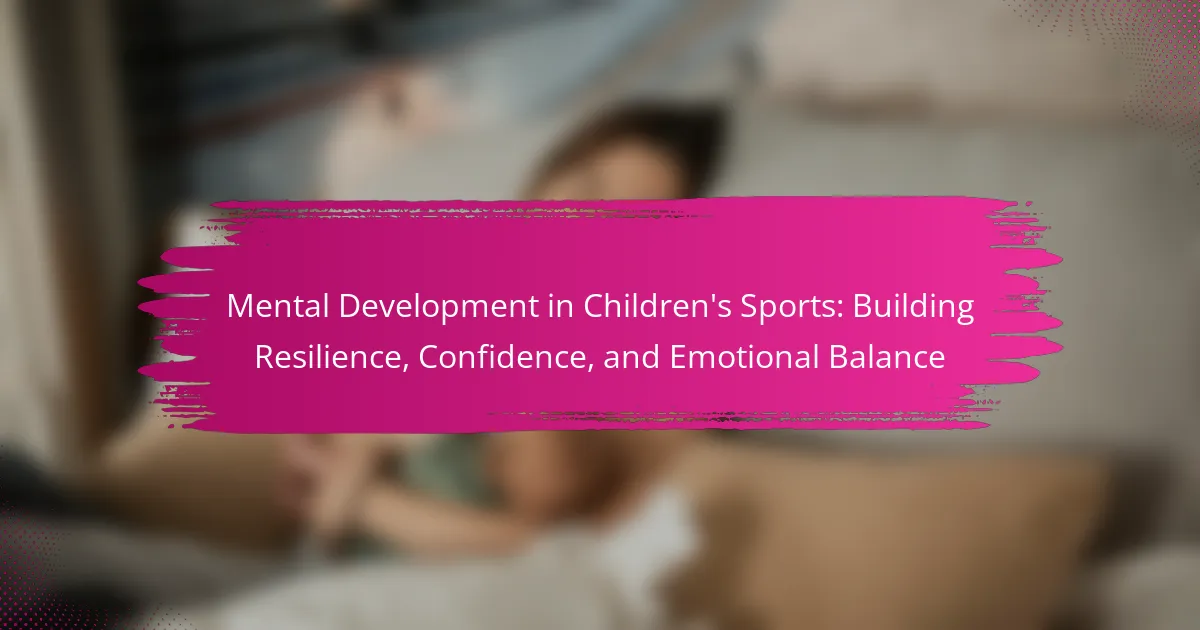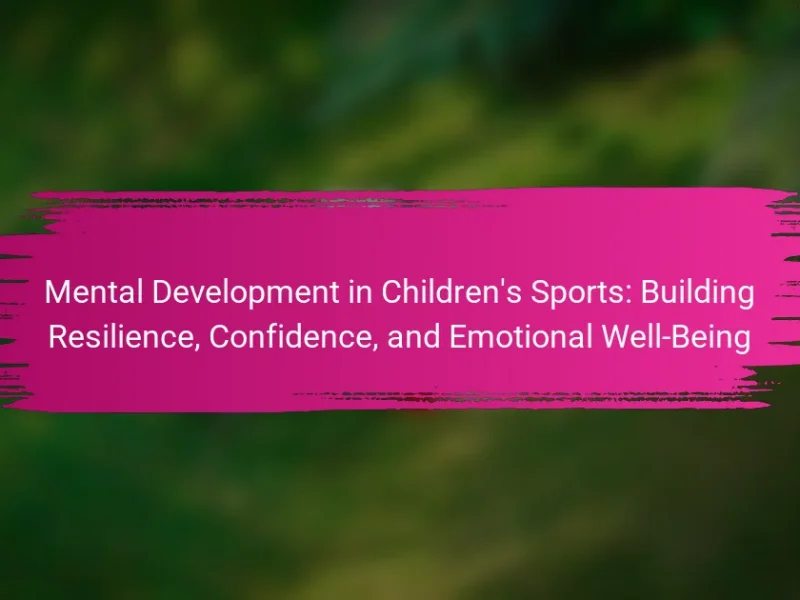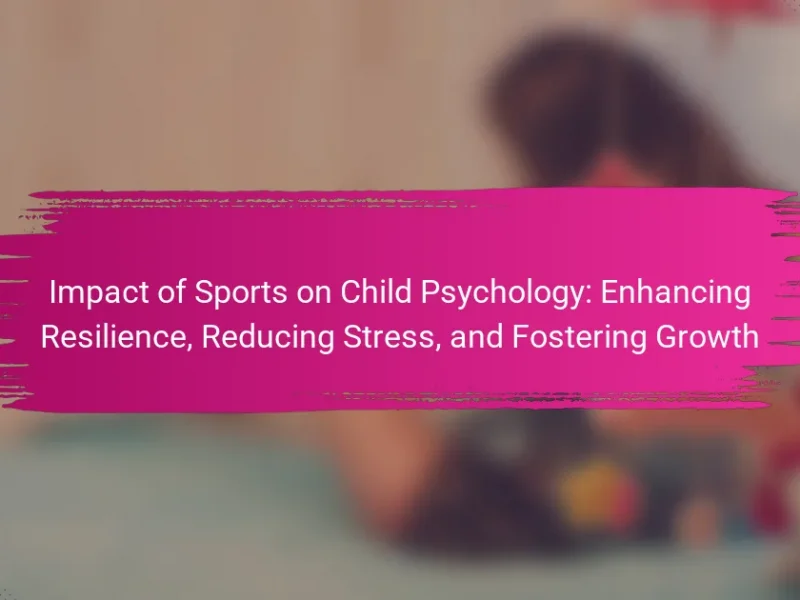Mental development in children’s sports is essential for fostering resilience, confidence, and emotional balance. These attributes help young athletes cope with challenges, enhance performance, and improve focus. Addressing mental stressors like performance pressure and identity issues is crucial for emotional well-being. Structured activities, positive reinforcement, and mindfulness techniques can support holistic mental growth in young athletes.
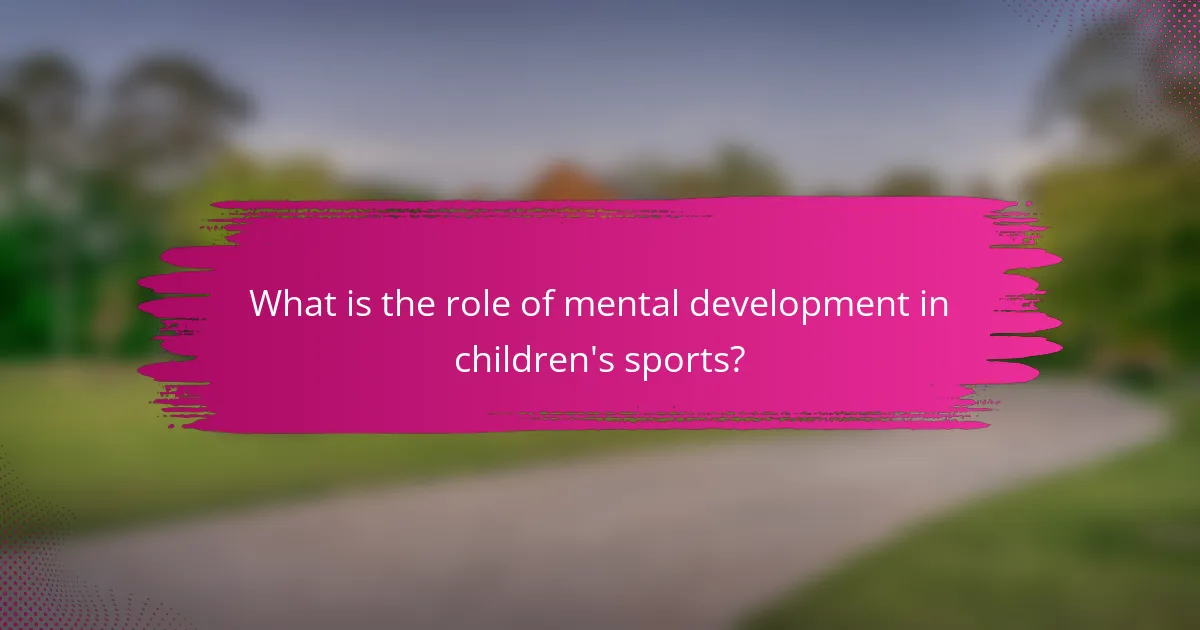
What is the role of mental development in children’s sports?
Mental development plays a crucial role in children’s sports by fostering resilience, confidence, and emotional balance. These attributes help young athletes navigate challenges and setbacks effectively. Resilience enables them to bounce back from failures, while confidence enhances their performance and willingness to take risks. Emotional balance contributes to better focus and teamwork, essential for success in competitive environments. Engaging in sports also promotes social skills and discipline, further supporting their overall mental growth.
How does mental development impact athletic performance?
Mental development significantly enhances athletic performance by fostering resilience, confidence, and emotional balance. These attributes enable young athletes to cope with challenges and maintain focus during competitions. Research indicates that children who engage in mental training exhibit improved stress management and decision-making skills, leading to better performance outcomes. Additionally, nurturing a growth mindset encourages persistence, allowing athletes to embrace failures as learning opportunities. Overall, mental development is crucial for cultivating the psychological skills necessary for success in sports.
What are the key components of mental development in young athletes?
Mental development in young athletes involves fostering resilience, confidence, and emotional balance. These components are crucial for navigating challenges in sports and life. Resilience helps athletes recover from setbacks, while confidence boosts performance. Emotional balance enables effective stress management and decision-making. Developing these attributes enhances overall mental health and athletic success.
How does resilience contribute to mental development?
Resilience significantly enhances mental development by fostering coping skills and emotional regulation. Children engaged in sports learn to handle setbacks, which builds confidence and promotes a growth mindset. This process encourages persistence, leading to improved problem-solving abilities. Resilience also contributes to emotional balance, allowing children to manage stress effectively.
What role does confidence play in sports participation?
Confidence significantly enhances sports participation by fostering a positive mindset. It encourages children to take risks, try new activities, and overcome challenges. High confidence levels correlate with increased motivation and persistence, leading to better performance outcomes. Studies show that children with strong self-belief are more likely to engage in sports consistently, promoting physical and mental resilience. Additionally, confidence helps manage stress and anxiety, creating a more enjoyable experience in sports.
How is emotional balance achieved through sports?
Engaging in sports fosters emotional balance by promoting teamwork, discipline, and coping strategies. These activities help children manage stress and develop resilience. Sports provide a structured environment where children learn to handle wins and losses, enhancing their emotional regulation. As a result, children build confidence and a positive self-image, crucial for emotional stability.

What are the universal benefits of mental development in sports?
Mental development in sports fosters resilience, confidence, and emotional balance in children. These benefits enhance their overall performance and well-being. Resilience helps children cope with challenges, while confidence boosts their self-esteem. Emotional balance improves their ability to manage stress and anxiety. Engaging in sports cultivates these attributes, making them valuable for personal growth and development.
How does mental training enhance focus and concentration?
Mental training significantly enhances focus and concentration in children’s sports. It develops mental resilience, allowing young athletes to maintain attention during competitions.
Techniques such as visualization and mindfulness train the brain to minimize distractions and improve performance under pressure. Research shows that athletes who engage in mental training experience a 30% increase in focus and a notable reduction in anxiety levels.
Additionally, consistent mental practice fosters emotional balance, helping children manage stress and maintain composure. This holistic approach not only boosts athletic performance but also builds confidence and self-esteem in young athletes.
What are the long-term advantages of mental resilience in athletes?
Mental resilience in athletes leads to improved performance, better stress management, and enhanced emotional stability. These long-term advantages contribute significantly to their overall mental development. Resilient athletes can maintain focus under pressure, recover quickly from setbacks, and cultivate a positive mindset. As a result, they are more likely to achieve their goals and sustain their passion for sports. This resilience also fosters confidence, allowing athletes to take risks and embrace challenges. Ultimately, mental resilience is crucial for an athlete’s success and longevity in their sport.

What unique challenges do young athletes face regarding mental stress?
Young athletes face unique challenges regarding mental stress, including performance pressure, identity issues, and social comparisons. These stressors can hinder mental development and resilience. Performance pressure stems from expectations from coaches, parents, and peers, leading to anxiety and fear of failure. Identity issues arise when young athletes tie their self-worth to their athletic performance, impacting their emotional balance. Social comparisons can create feelings of inadequacy, especially in competitive environments. Addressing these challenges is crucial for fostering confidence and emotional well-being in young athletes.
How do competitive pressures affect mental health in youth sports?
Competitive pressures can negatively impact mental health in youth sports by increasing anxiety and stress levels. This pressure often stems from expectations set by coaches, parents, and peers, leading to a fear of failure. As a result, young athletes may experience diminished self-esteem and emotional instability. Research indicates that 70% of youth athletes report feeling overwhelmed by competition. Building resilience through supportive environments can mitigate these effects, fostering confidence and emotional balance.
What strategies can help mitigate stress in young athletes?
Young athletes can mitigate stress through effective strategies like mindfulness, structured routines, and open communication. Mindfulness practices, such as meditation and breathing exercises, enhance focus and emotional regulation. Establishing structured routines fosters a sense of control and predictability, reducing anxiety. Encouraging open communication with coaches and parents promotes emotional support, allowing athletes to express their feelings and concerns. These strategies build resilience, contributing to overall mental development in sports.
What role does parental support play in managing stress?
Parental support significantly reduces stress in children participating in sports. It fosters resilience, enhances confidence, and promotes emotional balance. Supportive parents provide encouragement and constructive feedback, helping children navigate challenges. This involvement leads to improved performance and a positive sports experience. Studies show that children with strong parental backing exhibit lower anxiety levels, enabling them to focus better and enjoy their activities.
How can coaches foster a positive mental environment?
Coaches can foster a positive mental environment by promoting open communication and encouraging a growth mindset. They should create a supportive atmosphere where children feel safe to express their thoughts and emotions. Recognizing individual achievements, no matter how small, builds confidence. Implementing team-building activities enhances social connections, fostering emotional balance. Regular feedback helps children understand their progress, reinforcing resilience.

What rare attributes influence mental development in children sports?
Rare attributes influencing mental development in children’s sports include adaptability, social-emotional learning, and intrinsic motivation. Adaptability fosters resilience, allowing children to cope with challenges. Social-emotional learning enhances teamwork and communication skills, crucial for emotional balance. Intrinsic motivation drives engagement and persistence, leading to improved confidence and performance. These attributes create a supportive environment for holistic mental development in young athletes.
How does early specialization impact mental health?
Early specialization in sports can negatively impact children’s mental health by increasing stress and anxiety levels. This pressure may hinder emotional balance and resilience development. Studies indicate that children who specialize early often experience burnout and decreased enjoyment in their sport, leading to lower self-esteem. Furthermore, they may miss out on diverse social interactions that contribute to confidence-building. Encouraging a more varied sports experience promotes healthier mental development and emotional stability.
What are the effects of burnout on young athletes?
Burnout negatively impacts young athletes by diminishing their motivation, focus, and emotional balance. This decline can lead to reduced performance and increased anxiety. Young athletes may experience physical symptoms, such as fatigue and sleep disturbances, which further hinder their mental development. Resilience and confidence may also suffer, making it challenging for them to cope with competitive pressures. Addressing burnout is essential to promote healthy mental development in young athletes.
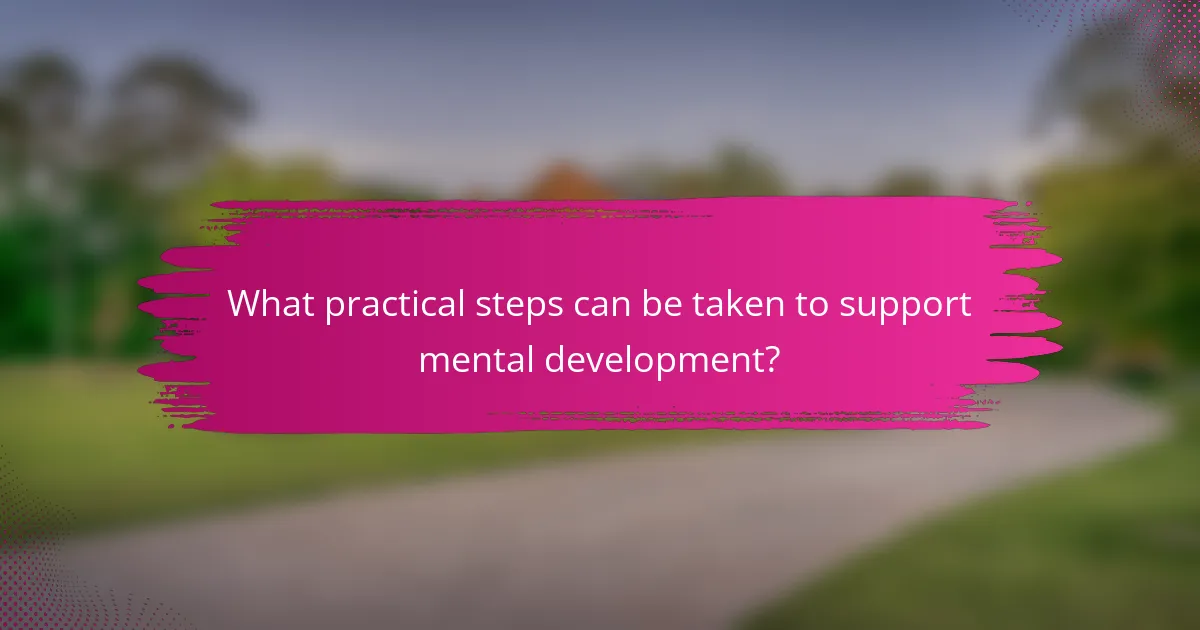
What practical steps can be taken to support mental development?
To support mental development in children through sports, focus on structured activities that build resilience, confidence, and emotional balance. Encourage participation in team sports to foster social skills and teamwork, which are vital for emotional growth. Establish a routine that includes regular practice, promoting discipline and a sense of achievement. Provide positive reinforcement to enhance self-esteem and motivate continued effort. Incorporate mindfulness techniques to help children manage stress and improve focus during competition. Finally, ensure a supportive environment that values effort over winning, allowing children to learn from failures and develop a growth mindset.
What best practices should parents adopt to encourage resilience?
To encourage resilience, parents should foster a supportive environment, promote problem-solving skills, and model resilience themselves. Establishing routines can provide stability, while encouraging independence helps children face challenges. Celebrate efforts and progress to build confidence.
How can schools integrate mental health resources for young athletes?
Schools can integrate mental health resources for young athletes by providing access to trained professionals, implementing educational programs, and fostering a supportive environment. Access to mental health professionals, such as counselors or psychologists, allows athletes to receive guidance tailored to their unique challenges. Educational programs can teach resilience and emotional balance, enhancing athletes’ coping skills. Additionally, creating a culture that prioritizes mental well-being encourages open discussions about mental health, reducing stigma and promoting healthy practices. These strategies collectively contribute to the mental development of young athletes, building their confidence and emotional stability.
What common mistakes should be avoided in supporting mental development?
To support mental development effectively, avoid common mistakes such as overemphasizing competition, neglecting emotional well-being, and failing to encourage a growth mindset. These errors can hinder resilience, confidence, and emotional balance in children. Overemphasizing competition can lead to stress and anxiety, while neglecting emotional well-being may result in a lack of support during challenges. Encouraging a fixed mindset limits children’s ability to learn from failures and adapt.
How can mindfulness techniques be effectively incorporated in training?
Mindfulness techniques can be effectively incorporated in training by integrating short, focused sessions that promote mental awareness and emotional regulation. These practices enhance resilience, confidence, and emotional balance in young athletes. For example, guided meditation can be utilized before practices to center attention and reduce anxiety. Breathing exercises can be introduced during breaks to help athletes manage stress and maintain focus. Additionally, visualization techniques can be employed to improve performance by mentally rehearsing skills and strategies. Regularly incorporating these techniques fosters a supportive environment that encourages mental development in children’s sports.
